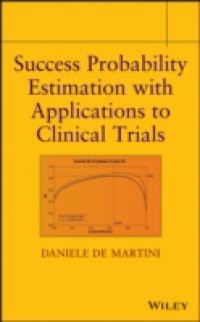Provides an introduction to the various statistical techniques involved in medical research and drug development with a focus on estimating the success probability of an experiment Success Probability Estimation with Applications to Clinical Trials details the use of success probability estimation in both the planning and analyzing of clinical trials and in widely used statistical tests. Devoted to both statisticians and non-statisticians who are involved in clinical trials, Part I of the book presents new concepts related to success probability estimation and their usefulness in clinical trials, and each section begins with a non-technical explanation of the presented concepts. Part II delves deeper into the techniques for success probability estimation and features applications to both reproducibility probability estimation and conservative sample size estimation. Success Probability Estimation with Applications to Clinical Trials: Addresses the theoretical and practical aspects of the topic and introduces new and promising techniques in the statistical and pharmaceutical industries Features practical solutions for problems that are often encountered in clinical trials Includes success probability estimation for widely used statistical tests, such as parametric and nonparametric models Focuses on experimental planning, specifically the sample size of clinical trials using phase II results and data for planning phase III trials Introduces statistical concepts related to success probability estimation and their usefulness in clinical trials Success Probability Estimation with Applications to Clinical Trials is an ideal reference for statisticians and biostatisticians in the pharmaceutical industry as well as researchers and practitioners in medical centers who are actively involved in health policy, clinical research, and the design and evaluation of clinical trials.





 7.33 (3)
7.33 (3) 











